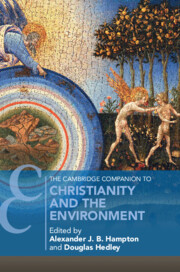Book contents
- The Cambridge Companion to Christianity and the Environment
- Cambridge Companions to Religion
- The Cambridge Companion to Christianity and the Environment
- Copyright page
- Contents
- Figures
- Contributors
- Preface
- 1 Introduction
- Part I Concepts
- 2 Naturalism, Supernaturalism, and Our Concern for Nature
- 3 From Disenchantment to Enchantment
- 4 Human and Nonhuman Animals from Secular and Sacred Perspectives
- 5 Anthropocentrism, Biocentrism, Stewardship and Co-Creation
- 6 Participation and Nature in Christian Theology
- 7 The Book of Nature
- Part II Histories
- Part III Engagements
- Index
- Cambridge Companions to Religion
- References
7 - The Book of Nature
from Part I - Concepts
Published online by Cambridge University Press: 21 July 2022
- The Cambridge Companion to Christianity and the Environment
- Cambridge Companions to Religion
- The Cambridge Companion to Christianity and the Environment
- Copyright page
- Contents
- Figures
- Contributors
- Preface
- 1 Introduction
- Part I Concepts
- 2 Naturalism, Supernaturalism, and Our Concern for Nature
- 3 From Disenchantment to Enchantment
- 4 Human and Nonhuman Animals from Secular and Sacred Perspectives
- 5 Anthropocentrism, Biocentrism, Stewardship and Co-Creation
- 6 Participation and Nature in Christian Theology
- 7 The Book of Nature
- Part II Histories
- Part III Engagements
- Index
- Cambridge Companions to Religion
- References
Summary
Although the motif of the book of nature is an ancient one, it continues to shape our cultural imagination in important ways, not least with respect to how we understand the relationship of science and religion and how we comport ourselves to questions of environmental ethics. Until its early modern transposition into the language of mathematics, the book of nature or liber naturae tradition formed the dominant approach to the interpretation of nature and creation within premodern Christian traditions. At the heart of the premodern idea of the book of nature stood a recognition of the entwined relationship between interpretive practices for the contemplative reading of sacred texts and those for making sense of nature. While this contemplative dimension falls to the wayside in many prominent modern appeals to the book of nature, especially those we associate with early modern science, it later reappears in popular transatlantic forms Christian piety, Romanticism, and nature writing, and arguably plays a significant role in the mediation of the novel moral intuitions about nature we associate with modern environmentalism.
- Type
- Chapter
- Information
- The Cambridge Companion to Christianity and the Environment , pp. 96 - 112Publisher: Cambridge University PressPrint publication year: 2022



